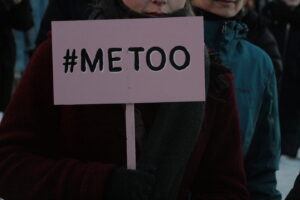by kwheele4 on February 25, 2021
Opinion

Trigger Warning: This piece talks about sexual assault.
By Julia McCoy ’22
Imagine telling a deeply personal story about trauma that you have experienced and immediately facing backlash from people stating that you are lying or that your story is fabricated. Sadly, this is the difficulty that thousands of women who speak out about their sexual assault face.
When it comes to speaking up about private, personal experiences, there is never one particular time to do it. The only timeline that people should follow is their own, especially when it comes to something as troubling as sexual assault.
In our time, with movements like #MeToo, people—specifically women—have begun to feel more empowered when speaking up about their experiences with sexual assault. This open environment has certainly been reassuring for some, but it does not solve the backlash that comes with speaking up.
Oftentimes, when a woman opens up about the trauma she has experienced, there will be those who question her motives, asking why she chose that moment to speak out, saying it was too early, too late, or in order to get something for herself.
Just a few weeks ago, congresswoman Alexandria Ocasio-Cortez posted an Instagram Live video to discuss her personal experience during the Capitol riot on Jan. 6. Among a variety of other important topics, Ocasio-Cortez also briefly mentioned that she is a survivor of sexual assault.
In response to this aspect of her conversation, many took to Twitter or conservative news stations and claimed that the congresswoman was exaggerating her assault experience to heighten the popularity of her account of the attacks. Kim Klacik, a former Maryland Republican congressional candidate, spoke on Fox News after Ocasio-Cortez went live, saying, “A lot of things she does is for attention, I wouldn’t be surprised if AOC makes money off her posts.”
Klacik’s sentiments were strongly echoed across the country, with many people quick to dismiss Ocasio-Cortez’s story as a fictional retelling of events. They agreed that her discussion of experience with sexual assault was a tactic to draw attention to her story, rather than an honest look into her past.
Ocasio-Cortez is unfortunately far too familiar with this scrutiny, but she is not the only person to experience this judgment after speaking out. Her experience only highlights the skepticism that thousands of women face when discussing their own personal experiences with assault.
This issue brings up a more general question: is there a right time to discuss your experience with sexual assault? If Ocasio-Cortez had opened up earlier in her career, would people have been more receptive and understanding? Why should any woman have to fear the response to some of her most emotional experiences?
Sexual assault is far too common in the United States, and especially on college campuses throughout the country. According to a 2016 survey from the National Sexual Violence Resource Center, over 20 percent of college-aged women have experienced “completed or attempted sexual assault.”
Of course, these are only the estimated numbers, as many cases could go unreported for years, or even a person’s entire lifetime. With this in mind, it is worth wondering how college campuses and society in general can become more accepting and open for women to discuss these deeply personal experiences.
The best thing that schools, and Providence College specifically, can do in these situations is to listen to survivors, regardless of when they decide to tell their story. Sexual assault and any form of violence is often hard to process, so survivors often take different amounts of time to cope with what has happened to them. Knowing that, it is important to foster an environment of compassion and understanding.
Based on the example of Ocasio-Cortez, it is clear that women of all statuses are judged for their individual coping processes. If this is happening to high-profile individuals, it is certainly happening in more private spheres with young adults and college students. Because there are so many women who experience some level of sexual assault during their time in college, it is important that all schools work to ensure that every story is treated with equal respect through counselors and Title IX coordinators.